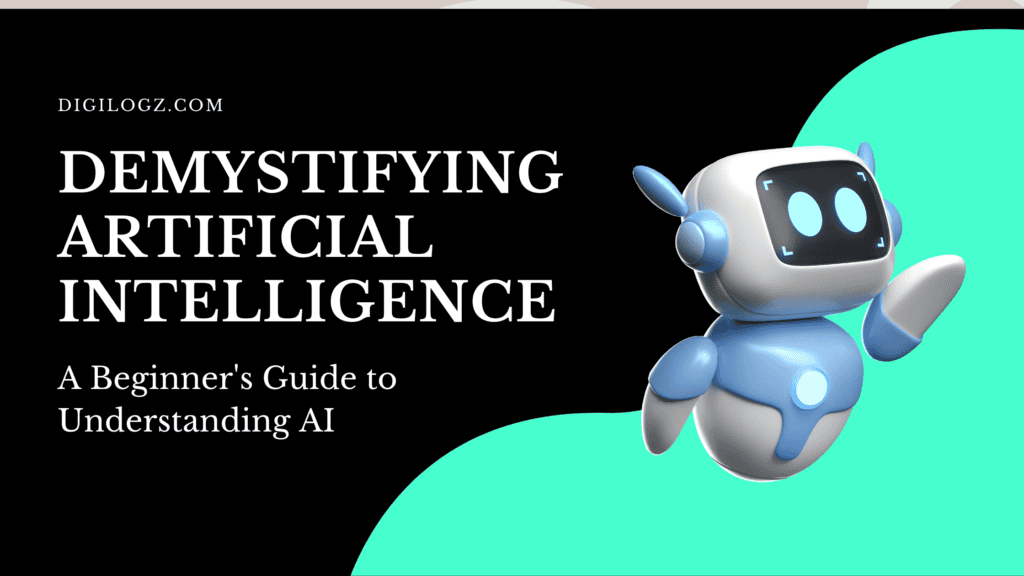In today’s rapidly evolving technological landscape, Artificial Intelligence (AI) stands at the forefront of innovation, promising to revolutionize various industries and aspects of our daily lives. However, understanding AI can seem daunting for beginners. In this comprehensive guide, we’ll break down the fundamentals of AI, its applications, ethical implications, and how you can embark on a journey to learn more about this transformative technology.
Introduction to Artificial Intelligence
Artificial Intelligence, or AI, is like giving computers brains. It helps them think and learn just like humans do. They can look at information, find patterns in it, and make choices based on what they learn.
History of Artificial Intelligence
AI has been around for a while now. It started with some big ideas back in the 1950s. Over the years, smart people kept working on it, making it better and better. Now, we see AI all around us, from the voice assistants in our phones to the self-driving cars on the roads.
Importance of Artificial Intelligence in Today’s World
AI is changing the way we do things in many industries. It helps businesses work faster and smarter. For example, it can analyze huge amounts of data in no time, helping doctors find better treatments for patients or helping companies make better decisions. AI is making our lives easier and more efficient every day.
Types of Artificial Intelligence
Narrow AI (Weak AI)
Think of Narrow AI as a specialist. It’s really good at doing one thing, like helping you find a song you’ll like or answering questions on your phone. It’s narrow because it’s focused on just one task or area.
General AI (Strong AI)
General AI is like a super-smart human. It can do all sorts of things, just like us. It can learn new skills, solve problems, and even have conversations. This is the kind of AI you see in movies, like robots that can do everything a person can.
Superintelligent AI
Now, Superintelligent AI is a bit like science fiction. It’s AI that’s way smarter than any human could ever be. We’re talking about machines that could solve problems we can’t even imagine, or come up with ideas that would never occur to us. It’s an exciting idea, but still just a theory for now.
Types of Artificial Intelligence:
| Type | Description |
| Narrow AI (Weak AI) | AI designed and trained for a specific task or set of tasks. Examples include virtual assistants like Siri and Alexa. |
| General AI (Strong AI) | AI with the ability to understand, learn, and apply knowledge across different tasks and domains, akin to human intelligence. Currently theoretical and not yet achieved. |
| Superintelligent AI | Hypothetical AI that surpasses human intelligence and capabilities in all aspects. Theoretical and subject to debate and speculation. |
Applications of Artificial Intelligence
AI in Healthcare
Artificial Intelligence is making waves in the healthcare industry, changing the way we approach diagnosis, treatment, and patient care. With AI, doctors can analyze vast amounts of medical data to identify diseases earlier, personalize treatment plans for patients, and even predict potential health issues before they occur.
AI in Finance
In the world of finance, AI is a game-changer. It’s used for everything from analyzing market trends and making investment decisions to detecting fraudulent activity and managing risk. With AI-powered algorithms, financial institutions can make faster, more informed decisions, leading to better outcomes for investors and businesses alike.
AI in Transportation
Transportation is another area where AI is making a big impact. From self-driving cars and drones to traffic management systems and logistics optimization, AI is helping to make transportation safer, more efficient, and more sustainable. By harnessing the power of AI, cities can reduce traffic congestion, lower emissions, and improve the overall quality of transportation services.
Applications of Artificial Intelligence:
| Application | Description |
| AI in Healthcare | Utilized for medical diagnosis, treatment planning, drug discovery, and personalized medicine. Examples include medical imaging analysis and predictive analytics for disease prevention. |
| AI in Finance | Used for fraud detection, risk assessment, algorithmic trading, and customer service automation. Examples include credit scoring models and chatbots for financial assistance. |
| AI in Transportation | Employed for route optimization, autonomous vehicles, traffic management, and predictive maintenance. Examples include navigation apps like Waze and self-driving cars. |
Ethical Implications of Artificial Intelligence
Job Automation
One of the key ethical concerns surrounding AI is its potential impact on employment. As AI technology advances, there is a risk of job displacement, as tasks traditionally performed by humans are automated. This can lead to economic inequality and unemployment in certain industries. However, AI also has the potential to create new job opportunities, particularly in fields related to AI development and implementation. To address these challenges, there is a growing need for upskilling and reskilling programs to prepare workers for the jobs of the future.
Bias and Discrimination
AI algorithms are only as unbiased as the data they are trained on. Unfortunately, many AI systems have been found to exhibit bias, leading to discriminatory outcomes, particularly against marginalized groups. This can have serious consequences, reinforcing existing inequalities and perpetuating discrimination in areas such as hiring, lending, and criminal justice. It’s crucial for developers to be aware of these biases and take steps to mitigate them, such as ensuring diverse and representative training data and implementing fairness-aware algorithms.
Privacy Concerns
AI systems rely on vast amounts of data to function effectively, raising concerns about privacy rights and data security. There is a risk that sensitive personal information could be misused or exploited by AI systems, leading to privacy violations and breaches of trust. Additionally, the use of AI for surveillance purposes raises questions about the erosion of privacy rights and the potential for abuse by governments and corporations. As AI technology continues to advance, it’s essential to establish robust regulations and safeguards to protect individuals’ privacy and data security.
Ethical Implications of Artificial Intelligence:
| Ethical Concern | Description |
| Job Automation | Raises concerns about potential job displacement and the need for retraining and upskilling of the workforce. Also prompts discussions on universal basic income and job creation in AI-driven economies. |
| Bias and Discrimination | Highlights issues of biased algorithms leading to unfair treatment or exclusion of certain groups. Requires attention to data quality, algorithm transparency, and diversity in AI development teams. |
| Privacy Concerns | Raises questions about data privacy, surveillance, and consent in the collection and use of personal information by AI systems. Calls for robust privacy regulations and transparent data practices to safeguard individual rights. |
How to Learn Artificial Intelligence
Online Courses and Tutorials
Embark on your AI learning journey with a wealth of online resources, courses, and tutorials tailored to every skill level. From introductory primers to advanced deep dives, online platforms offer a diverse array of learning materials to suit your learning style and pace. Whether you prefer interactive video lectures, guided tutorials, or self-paced modules, there’s an online course or tutorial out there to help you grasp the fundamentals and master advanced AI concepts.
Books on Artificial Intelligence
Delve into the world of AI literature with a curated selection of books authored by leading experts in the field. These books cover a wide range of topics, from foundational principles to cutting-edge research, offering valuable insights and perspectives on the theory, practice, and implications of artificial intelligence. Whether you’re interested in machine learning, neural networks, natural language processing, or ethical considerations, there’s a book to deepen your understanding and broaden your horizons in the field of AI.
Practical Projects and Experiments
Take your AI knowledge from theory to practice with hands-on projects and experiments designed to reinforce your understanding and develop your skills. From building simple AI models to tackling real-world challenges, practical projects provide invaluable experience and insight into the application of AI concepts and algorithms. Whether you’re working on image classification, natural language processing, or reinforcement learning, engaging in practical projects and experiments is an essential step in becoming proficient in artificial intelligence.
Conclusion
In conclusion, Artificial Intelligence holds immense potential to revolutionize various industries and aspects of our society. By understanding the fundamentals of AI, its applications, and ethical implications, we can navigate the advancements in this field with informed perspectives and contribute to shaping its responsible development and deployment.
FAQs
Q1. What are some common misconceptions about Artificial Intelligence?
A: Common misconceptions about AI include fears of sentient robots taking over the world and job loss due to automation. In reality, AI is a tool created and controlled by humans, and its impact on employment varies across industries.
Q2. How can Artificial Intelligence benefit humanity?
A: AI has the potential to improve healthcare outcomes, enhance productivity and efficiency across industries, and address complex societal challenges such as climate change and poverty.
Q3. What are some ethical dilemmas associated with the development of AI?
A: Ethical dilemmas in AI include issues of bias and discrimination in algorithms, concerns about data privacy and security, and questions surrounding the accountability and transparency of AI systems.



